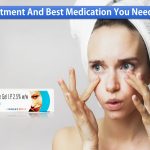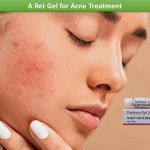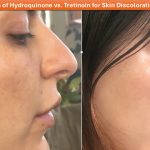Acne is the most common cause of dark spots. Most people with acne are aged between 12 and 25, but some older and young people also experience acne. The small sebaceous glands lie just under the skin’s surface and make oil sebum, which keeps the skin supple and smooth. Tiny pores on the skin’s surface allow the sebum to enter the skin. Some of these tiny pores become blocked in acne, causing small pimples, whiteheads, and blackheads.
Benzoyl Peroxide is the world’s most frequently used treatment for acne; it fights with acne bacteria, so they don’t have the nutritional resources to reproduce. Since bacteria have a very short lifetime, after about 2 or 3 days, there are almost no bacteria left on the skin. Benzoyl Peroxide has three major working actions- it kills germs or bacteria, reduces inflammation, and helps to unplug the blocked pores. Benzoyl Peroxide is also available in combination preparations used for acne treatment. It can be combined with an antibiotic called clindamycin or with another preparation used for treating acne called adapalene. Both of these products need to be bought if your dermatologist recommends you. Benzoyl Peroxide is used to treat mild to moderate acne. It can be used in combination with other acne treatments. When applied to the skin, it works by reducing the amount of acne-causing bacteria’s and by causing the skin to dry and peel.
Benefits of Benzoyl Peroxide-
Benzoyl Peroxide is one of the best topical solutions for treating mild to moderate acne. It is also an effective adjunct therapy to other topical ointment or oral antibiotics in more severe cases of acne. Benzoyl Peroxide is easily available over the counter, and products containing Benzoyl Peroxide come in many different forms, including creams, gels, lotions, soaps, and pads. Some of the best features of Benzoyl Peroxide are here below:
- Fast Acne Removal
One of the biggest advantages of Benzoyl Peroxide is that it clears blemishes fast by killing the acne-causing bacteria. Initially, it was used on affected areas because it dries up the pimples very quickly. New concentrations and formulations have been introduced; products that contain lower concentrations are as effective as those with higher concentrations. It means you can get the same results without any dryness.
- Acts as an Anti-Inflammatory agent
Benzoyl Peroxide also acts as an anti-inflammatory agent by reducing skin oxygen because it reduces pore bacteria. It works to reduce inflammation within the blemish.
- Decreases Oil Production-
Benzoyl peroxide can decrease the skin’s oil production. Overactive oil glands contribute to acne because excess oil plugs pores or hair follicles and also prevents dead skin cells from sloughing away. A build-up of dead cells further irritates and clogs pores. Blocked pores turn into whiteheads or blackheads, which may turn into swollen, red, pus-filled bumps known as pimples. They also develop into large, painful cysts or nodules under the skin surface that can cause scarring.
- Antibiotic Properties-
Benzoyl Peroxide is a topical antibiotic that kills Propionibacterium acnes. Propionibacterium acne is the bacteria that causes acne and also results in inflammation. Propionibacterium acnes are anaerobic, which means it cannot survive in an oxygenated environment. Benzoyl Peroxide is an oxidizing agent, applying this substance moves oxygen into clogged pores and eliminates anaerobic bacteria. It is more effective at eliminating this bacteria than other topical solutions, including salicylic acid, resorcinol, and sulfur. Some acne treatment products and systems combine Benzoyl Peroxide with one or more of strong ingredients to increase effectiveness.
Side Effects-
- Causes dehydration and, at times, premature aging
Benzoyl Peroxide is associated with premature aging and dehydrated skin, since it causes irritation to occur anything irritating is usually dehydrating. If a quality moisturizer is consistently used, the skin can bounce back to normal one.
- Can lead to hyperpigmentation
Post-inflammatory hyperpigmentation (PIH) is a vital feature of acne, and Benzoyl Peroxide does little to help it. It creates significantly more hyperpigmentation, especially in medium to darker skin tones, because of the irritation it can cause.
- Induces sun damage
Benzoyl Peroxide cleans the pore but some experts say as it does this, it makes the skin thicker and decreases its ability to protect itself from the sun. Benzoyl Peroxide weakens the effects of your SPF and makes the skin more sensitive to the sun.
Precautions-
- Before using Benzoyl Gel, tell your dermatologist if you are allergic to it or if you have any other allergies. This product may contain inactive ingredients (such as perfumes) that can cause allergic reactions or other problems with your skin.
- Benzoyl may make your skin more sensitive to the sun. Avoid prolonged sun exposure, sunlamps, and tanning booths. Use sunscreen and protective clothing when going outside.





